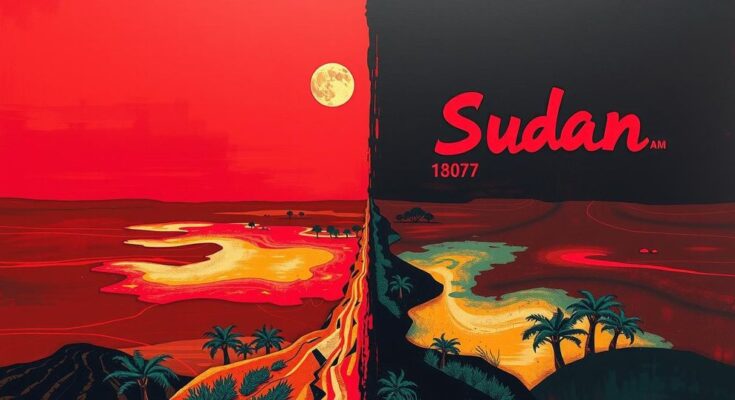Sudan’s civil war approaches its second anniversary on April 15, raising fears of a second partition due to ongoing conflict between the SAF and RSF. The humanitarian crisis is dire, impacting 30 million people and causing economic losses of $15 billion. Historical context reveals Sudan’s troubled past of misgovernance and civil strife. The international community’s response remains cautious, fearing further destabilization in the region as factions vie for power.
As the civil strife in Sudan nears its second anniversary on April 15, the nation faces a potential second partition that could have significant repercussions for the already fragile Horn of Africa. The ongoing conflict has spiraled into what the UNICEF chief recently described as the world’s most severe humanitarian crisis, affecting 30 million people, which is approximately two-thirds of the Sudanese population. With casualties reported to exceed 20,000 and economic losses projected at $15 billion, the situation remains critical for the country.
Sudan’s history is marked by strife, having endured 15 military coups and two civil wars since its independence in 1956, culminating in the secession of South Sudan in 2011. The root of the current turmoil can be traced back to the autocratic rule of Omar Hassan al-Bashir, who was overthrown in a coup in April 2019 following widespread protests. Subsequent efforts to establish a civilian-military government have faltered, leading to another coup in October 2021, which saw Gen. Abdel Fattah al-Burhan assume power. This created further conflict with the RSF, led by Gen. Mohammed Hamdan Dagalo, culminating in civil war on April 15, 2023.
The civil war has persisted despite multiple attempts at peace talks, with ceasefires consistently failing to hold. The Sudan Armed Forces (SAF) have gained advantages in recent months, reclaiming significant territories including the national capital, Khartoum. Conversely, the RSF maintains control over areas in the west, particularly Darfur, intensifying the conflict. Consequently, the ambitions of both warlords overshadow the original call for civilian governance.
The military dynamics strongly suggest a potential partition of Sudan, prompting strategic announcements from both factions. In February, the RSF and allies declared a ‘New Sudan’ government, while the SAF announced intentions to form a transitional civilian government. However, skepticism remains regarding the legitimacy and functionality of these proposed governance structures amid ongoing hostilities.
International reactions to these developments have been cautious. The UN Security Council and the African Union have expressed deep concerns that the establishment of a parallel government by the RSF may exacerbate the humanitarian situation and lead to Sudan’s partition. Historical precedence from Libya’s partition raises alarms about the potential instability and humanitarian crises that could ensue, especially given the RSF’s legacy of violence against certain ethnic groups.
Moreover, the international community displays a mixed response to the Sudanese civil war. Nations such as Egypt, Turkey, and Iran support the SAF, while the UAE reportedly backs the RSF. The geopolitical motivations behind this support remain layered, influenced by both regional strategy and resource exploitation. As Sudan grapples with the specter of further partition, historical context and present-day dynamics suggest a precarious future fueled by internal and external pressures.
While some analysts perceive that the partitioning of Sudan may conclude the ongoing civil war, the overarching concerns about humanitarian fallout and regional stability complicate this perspective. Ultimately, the international community’s attention is divided, leading to a precarious balance in addressing the ongoing crises in Sudan and its implications on surrounding countries.
In conclusion, Sudan stands at a critical juncture with the potential for a second partition looming on the horizon as the civil war enters its second year. The humanitarian crisis has reached unprecedented levels, directly affecting millions of citizens, while the historical context of Sudanese conflicts complicates the outlook for resolution. Diplomatic efforts remain fragile amidst competing interests from domestic factions and international stakeholders. With substantial risks associated with a fragmented Sudan, future stability hinges on finding a sustainable path towards peaceful governance free from the influence of warlords.
Original Source: www.ndtv.com




